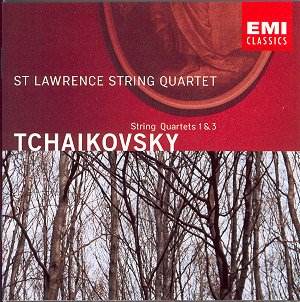The previous disc by the St Lawrence Quartet, of music by Schumann,
made a very favourable impression, and this Tchaikovsky issue makes a
worthy successor.
Tchaikovsky writes marvellously for strings, whether
in orchestral or in chamber music, and the St Lawrence Quartet are aware
of the subtle nuances of expression on which his musical style is founded.
They play as a team, beyond the obvious sense that a string quartet
must, and their performances give the impression of having been thoroughly
researched and thought through. Thus it is that the wonderful early
Quartet in D, Opus 11, has a bitter-sweet quality, of melancholy lurking
behind a generally outgoing disposition.
If the performance of the D major Quartet has a fault
it is in the balance of the ensemble, or at least of the recording.
The cello seems forwardly projected, to the extent that the perspective
is slightly unbalanced. There is nothing untoward about this, however,
since the richer sonorities that result give the music a different interpretative
flavour. But if forced to issue a single recommendation, it would go
to the remarkable performance by the Borodin Quartet (Teldec 4509 90422
2). The St Lawrence players still give much pleasure, especially in
the famous Andante cantabile slow movement.
The performance of the Third Quartet is most convincing.
In this piece the lengthy first movement, at nearly 17 minutes, is the
special challenge, and the St Lawrence players rise to it with expressive
conviction and technical command. After this the short Allegro vivo
is intended as a relief, and the lively darting rhythms do prove the
perfect foil. Then the third movement, funereal in character, resumes
the tragic intensity, and this mood is once again projected with expressive
conviction and intensity. The finale, characterised by Tchaikovsky's
'risoluto' description', attempts to achieve triumph out of grief.
This is an excellent performance, and the recording
is good too, an unqualified success after the qualified success of the
First Quartet. This is altogether a splendid disc, although the recording
by the Borodin Quartet is better still.
Terry Barfoot


